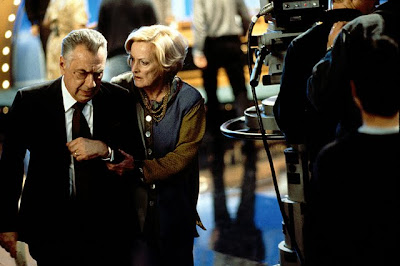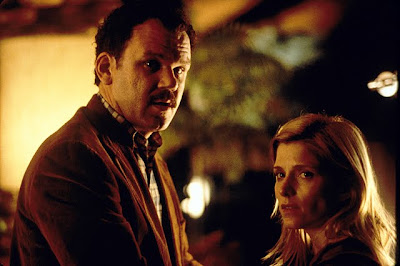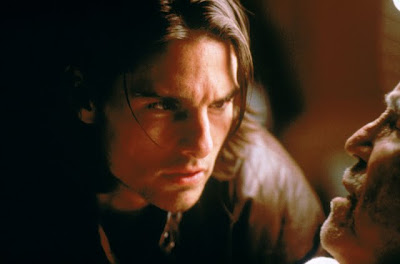Now Available to Own
More from Paul Thomas Anderson
Read our Reviews of Paul Thomas Anderson's
Boogie Nights
There Will Be Blood
Photo Slideshow
“Form a tragedy,” Frank T.J. Mackey (Tom Cruise) tells his captive audience of misogynistic men all rallied together at his workshop seminar called “Seduce and Destroy.” And although forming a tragedy is another elaborate trick taught by Frank to lure any “sweet mama baby” he wants, in Paul Thomas Anderson’s dizzying masterwork Magnolia, Frank is just one of over a dozen characters who find themselves in the midst of tragedy from start to finish.
However, while some of the tragedies in the multiple-act operatic film are self-created such as in William H. Macy’s quest to get braces to try and genuinely attract his crush, others including the cancer rotting away in the bodies two characters in particular are as unpredictable as the weather. Or are they?
In one of American cinema’s greatest opening sequences-- narrated by Ricky Jay to boot-- Anderson introduces us to what we’re led to believe is the overall thesis the movie as we encounter three bizarre crimes (based on both fact and urban legend) and the surprisingly high probability of chance, coincidence or possibly destiny involved in each.
Fortunately, since in this roughly three hour Altmanesque film we’re introduced to so many characters that on Wikipedia site users have actually created a diagram and a chart to keep them all straight, there’s a large amount of overlap between the plots and individuals that you wouldn’t assume would be in the orbit of others “for the sake of momentum,”* and therefore, viewer sanity.
Yet because after all it is Los Angeles, it's tempting to view with the easy link of events that are tied to a TV game show since we meet an old quiz kid and a new one, the producer and his wife, the host and his wife, their children, and others related to them. However, it’s the tragic theme that “we may be through with the past but the past ain’t through with us,” that really unites them all.
A recurring issue for Paul Thomas Anderson’s oeuvre centers on not just familial dysfunction and especially neglect/abandonment/abuse or betrayal by the father (or avuncular male figure) in the life of one or more of the film's characters. And while it’s pared down to its essence in his most recent masterpiece There Will Be Blood, it is the key to understanding Magnolia since "the past" incorporates many things to many characters but it’s the bad dads that reign supreme.
Intriguingly, Anderson has written in a cancer diagnosis for the two biggest fatherly offenders, which invites that stomach-sinking feeling of both pathos and anger as the children they’ve hurt in ways not initially apparent to us must figure out just what exactly they can forgive and where to go from there.
Thus, "it’s a tough part of the job,” and “a tough part of walkin’ down the street,” as Officer Jim (John C. Reilly) narrates to his shotgun in his L.A.P.D. squad car en route to a 187 before he meets a woman he doesn’t realize is probably a few more doses of cocaine away from a different police code for death. And while she’s nervous about his arrival for blasting Aimee Mann music too loudly-- fearfully mistaking it's a drug raid-- Reilly’s Jim is oblivious to her pain since he was instantly smitten with the shy, sweet, self-destructive but soft-spoken and pretty blonde.
Throughout the film, people make connections-- if only for an instant-- as calls are dropped, guns are lost in the rain, a pharmacist goes from nice to nosy, or a lawyer hears something they realize they want to ignore. Yet, through it all, love is blooming like the magnolia flowers that appear in countless paintings throughout the film.
And this is evident whether it’s in the compassion of a home hospice nurse (Philip Seymour Hoffman) for his dying patient (Jason Robards) whose gold-digging trophy wife (Julianne Moore) realizes she doesn’t want the money if it won’t bring her husband back from the grip of cancer that all the magnolia bark in the world can’t cure or Jim’s new-found love for the troubled young woman he visits on the job for a noise complaint before the same woman gets back in touch with the mom she misses.
Thankfully packing his film with unexpected bursts of humor and enough eccentricities to distract you from what would’ve otherwise been far too of an extremely melancholic tone, Anderson’s follow-up to Boogie Nights is nonetheless harder-edged than the previous film since it’s one that deals with subject matter much closer to home than the 1970s extended makeshift family of those in Boogie’s porn industry.
Inspired by the music of Aimee Mann, some passages in Exodus, magnolia flowers, his favorite actors including the opening image that flooded his brain of Melora Walters’ smile that ended the film, Magnolia is still as potent with this Warner Brothers debut on Blu-ray eleven years after it bowed onscreen in what Entertainment Weekly rightfully named one of cinema’s best years of 1999.
Offering you six times the clarity experienced previously on DVD, although Magnolia doesn’t offer any new Earth-shattering extras those who owned the 2-disc set are unfamiliar with, it’s a gorgeous transfer to high-definition with sound to match, regardless of your speaker set-up. As the film’s most discussed out of the dark gray-blue night sky sequence begins and the first thud hits the ground, you’ll be amazed by the sharpness of the disc given your ability to hear every single noise separate from the next and the way that Anderson’s trademark meandering camera races to position before the action even gets there at times looks more incredible than ever.
Luckily avoiding sound balance issues between the music of Aimee Mann and the dialogue spoken by Oscar nominated Tom Cruise in some of the finest work in his entire career evidenced in the way his hyper bravado turns quiet when he begins “silently judging” an interviewer, Magnolia makes for another dynamite Anderson transfer, released by the studio on the same day that WB also offered Boogie Nights to the Region 1 equipped world.
And while both films are exceptional for different reasons, in the end, it’s Magnolia that deserves the most repeat viewings for clarity sake and to catch other missed connections and references to both the real world and Anderson’s fictitious one. Similarly, although I think that There Will Be Blood is the best film of the last decade and likewise of Anderson’s career so far, out of the three available in the format, it’s Magnolia that makes the greater impact on Blu-ray, most likely because of how many scenes take place in darkly lit areas that match the tragedies that have formed out of nowhere like an ever-changing forecast.
*Lyrics from Aimee Mann's “Momentum”
Text ©2010, Film Intuition, LLC; All Rights Reserved. http://www.filmintuition.com
Unauthorized Reproduction or Publication Elsewhere is Strictly Prohibited and in violation of the Digital Millennium Copyright Act.
FTC Disclosure: Per standard professional practice, I received a review copy of this title in order to evaluate it for my readers, which had no impact whatsoever on whether or not it received a favorable or unfavorable critique.






















